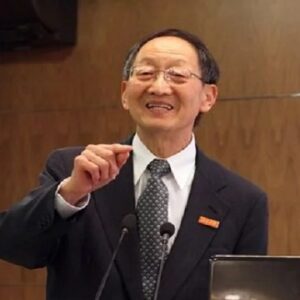Daniel Chee Tsui is an American physicist of Chinese descent who specializes in semiconductors and solid-state physics. For his contributions to the discovery of the fractional quantum Hall effect, he was awarded a share of the Nobel Prize in Physics in 1998. He was born into a poor farming family in China and attended a village school for his primary education. Despite the numerous hardships they faced in their drought-prone, war-ravaged village, his parents tried their hardest to provide a good life for their children. They sent Tsui to Hong Kong for his education because their native village lacked adequate educational opportunities. He was accepted to the National Taiwan University Medical School in Taipei, Taiwan, after completing his education. Soon after, he was offered a full scholarship to Augustana College in Rock Island, Illinois. He eventually received his PhD in physics from the University of Chicago. He began his professional career at Bell Laboratories, where he conducted groundbreaking semiconductor research that led to the discovery of the fractional quantum Hall effect. He changed his career path in the early 1980s when he accepted a position as Professor of Electrical Engineering at Princeton University.
Childhood and Adolescence
Daniel Chee Tsu was born on February 28, 1939, into a farming family in Fan village, Henan, China. He grew up in a small village that was prone to droughts and floods, as well as being threatened by war. His parents, on the other hand, took great pains to ensure that their children grew up in a loving environment.
His parents had never had the opportunity to receive an education, so they were extremely concerned that their children receive a good education. They sent Tsui to Hong Kong for his education in 1951 because there were no good schools in their village.
He went to Pui Ching Middle School, where he was taught by highly qualified teachers who instilled in him an insatiable desire to learn. He received his diploma in 1957.
He was accepted into National Taiwan University’s medical school, as well as a two-year government-run special program aimed at preparing Chinese high school graduates for admission to the University of Hong Kong.
Around the same time, he learned that he had been awarded a full scholarship to Augustana College in Rock Island, Illinois.
In 1958, he accepted the scholarship and relocated to the United States. His time at the university was fruitful, and he graduated Phi Beta Kappa in 1961. He then went on to receive his PhD in physics from the University of Chicago in 1967.
Career of Daniel
In 1968, he joined Bell Laboratories after a year of postdoctoral research in Chicago. He concentrated his research in solid state physics, particularly semiconductor research, there.
While he did not venture into semiconductor physics, which was mostly optics and high-energy band-structures, or its application in device applications, he established a reputation as an expert in what was dubbed “two-dimensional electron physics.”
He worked on the Hall effect, which is the development of a crosswise electric field in a current-carrying ribbon whose surface is perpendicular to a strong magnetic field, as part of a research team that included Horst Störmer.
The team investigated the quantum Hall effect at temperatures near absolute zero and under extremely powerful magnetic fields as part of their research. The discovery of the fractional quantum Hall effect was a watershed moment in experimental physics, bringing international acclaim to the scientists.
In 1982, Daniel Chee Tsui accepted the Arthur LeGrand Doty Professor of Electrical Engineering position at Princeton University’s School of Engineering and Applied Science, shortly after the fractional quantum Hall effect was discovered.
In 1988, he was a plenary speaker at The Chinese University of Hong Kong’s Third Asia Pacific Physics Conference, which was held to commemorate the university’s 25th anniversary. He gave a talk about the quantum Hall effect there.
He’s also worked as an adjunct senior research scientist at Columbia University’s Department of Physics, where he was a visiting professor from 2006 to 2008.
Major Projects of Daniel
The fractional quantum Hall effect (FQHE) is a physical phenomenon in which the Hall conductance of 2D electrons shows precisely quantized plateaus at fractional values of e2/h, which was discovered and explained by Daniel Tsui in collaboration with Horst Störmer. It is the collective behavior of electrons in a two-dimensional system.
Achievements & Awards
“For their discovery of a new form of quantum fluid with fractionally charged excitations,” Daniel C. Tsui, Robert B. Laughlin, and Horst L. Störmer shared the Nobel Prize in Physics in 1998.
He was awarded the Oliver E. Buckley Condensed Matter Prize and the Benjamin Franklin Medal in Physics in 1984. (1998).
Tsui is also a member of the National Academy of Sciences, the National Academy of Engineering, an American Association for the Advancement of Sciences fellow, and an American Physical Society fellow.
Personal History and Legacy
He fell in love with Linda Varland, an undergraduate at the university, whom he later married, while studying there.
Estimated Net Worth
The net worth of Daniel is unknown.


